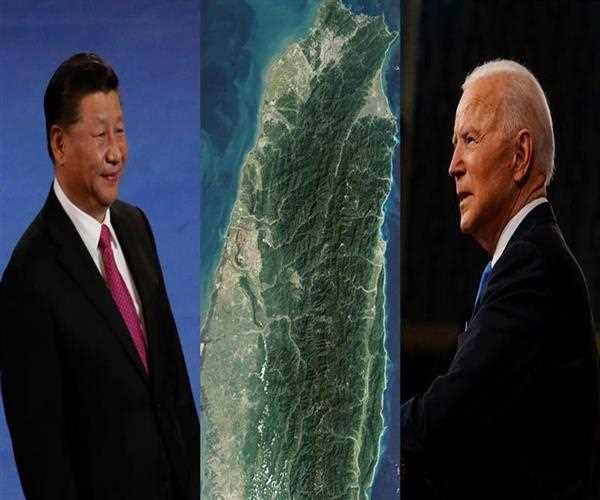
16-Jun-2022 , Updated on 6/16/2022 1:22:01 AM
Taiwan: Are the US and China heading to war over the island?
Taiwan, officially known as the Republic of China, is an island country in East Asia. Though considered to be part of China earlier, it is separated from the mainland by Taiwan Strait. It has governed independently of mainland China since 1949. The mainland views the country as a treacherous province and has vowed to eventually unite Taiwan with mainland China.
tensions escalated since the election of Taiwanese President Tsai Ing-wen in 2016 who refused to accept the formula endorsed by her predecessor, Ma Ying-jeou, to allow for increased cross-strait ties. meanwhile, Beijing has taken some severely aggressive actions, including flying fighter jets near the island. analysts have feared a war between the United States and China if China attacks Taiwan. Beijing claims there is only 'one China,' of which Taiwan is a part. It considers the People's Republic of China to be China's only legitimate government, a position it refers to as the 'One-China concept,' and desires Taiwan's eventual 'unification' with the mainland.
Beijing asserts Taiwan is bound by the 1992 Consensus, an agreement negotiated between members of the Chinese Communist Party (CCP) and the Kuomintang (KMT), which controlled Taiwan at the time. However, the two parties disagree on the content of this ostensibly agreed-upon agreement, and it was never intended to resolve Taiwan's legal status.
The 1992 Consensus shows an understanding that 'the two sides of the strait belong to one China and will work together to accomplish national reunification,' as Chinese President Xi Jinping has declared. It signifies 'one China, various interpretations' for the KMT, with the ROC standing for 'one China.'
President Tsai has refused to recognise the consensus in writing. Instead, she has endeavoured to find a different phrasing that Beijing will accept. Tsai declared she was 'elected president in line with the Constitution of the
Republic of China,' which is a one-China constitution, and that she would 'safeguard the sovereignty and territory of the Republic of China' in her 2016 inaugural address. Tsai also promised to 'handle cross-strait affairs in line with the Republic of China Constitution, the Act Governing Relations Between People of [the] Taiwan Area and the People of the Mainland Area, and other applicable legislation.'
Beijing, on the other hand, rejected this statement and severed ties with Taiwan. In a speech in 2019, Xi restated China's long-standing plan for Taiwan, which is to integrate it into the mainland under the 'one nation, two systems' formula. This is the same formula that was used to secure Hong Kong's capacity to maintain its political and economic institutions while also granting it a 'high degree of autonomy.' The people in Taiwan are strongly opposed to such a structure.
Tsai and even the KMT have rejected the 'one nation, two systems' concept, citing Beijing's recent attack on Hong Kong's freedoms.
The United States and the People's Republic of China established official diplomatic ties in 1979. At the same time, it cut diplomatic ties with the ROC and terminated their mutual defence treaty. However, the US maintains a strong unofficial connection with the island, selling defensive weapons to its military. Beijing has frequently pushed the US to stop sending weapons to Taiwan and to cut ties with the country. The United States' strategy is guided by its One-China policy.
The major purpose of the United States is to maintain peace and stability in the Taiwan Strait, and it has urged both Beijing and Taipei to do so. For decades, the United States has tried to strike a fine balance between backing Taiwan and avoiding a confrontation with China through its policy of strategic ambiguity. President Joe Biden, on the other hand, appears to be against the strategy, indicating multiple times that the US would defend Taiwan if China invaded.
White House officials have pulled down his statements, claiming that policy has not changed, but the president ultimately has the final word on how to respond. Some experts, like Richard Haass and David Sacks of the CFR, as well as a number of members of Congress, have praised Biden's remarks, claiming that China's rising assertiveness needs transparency. This viewpoint has been challenged by other specialists. China's expanding military capabilities and aggressiveness, as well as the worsening in cross-strait relations, are causes of anxiety among American experts.
An argument like this might escalate to a clash between the US and China. Because China hasn't ruled out using force to achieve Taiwan's 'reunification,' the US hasn't ruled out supporting Taiwan if China attacks. China's military is 'likely preparing for a contingency to unify Taiwan with the PRC by force, while simultaneously deterring, delaying, or denying any third-party intervention, such as the United States,' according to a 2021 report from the US Department of Defense. Experts, on the other hand, differ on the likelihood and timing of a Chinese invasion.
In 2021, the top US military commander in the Indo-Pacific warned that China might try to invade Taiwan within the next decade, though some experts believe this is still a long way off. Others believe 2049 is a crucial year; Xi has stated that unification with Taiwan is critical to achieving what he refers to as the Chinese Dream, which calls for the restoration of China's great-power status by 2049.
Regardless, the PLA has made it one of its top priorities to prepare for a Taiwan contingency, and Taiwan has been a major catalyst for China's military modernization. The
PLA stated in a defence white paper published in 2019 that it would 'decisively defeat anyone attempting to separate Taiwan from China.'

Student
current post-graduate student at christ university and an aspiring content writer with experience in working on online content creation and research..
Comments
Join Our Newsletter
Subscribe to our newsletter to receive emails about new views posts, releases and updates.
Copyright 2010 - 2026 MindStick Software Pvt. Ltd. All Rights Reserved Privacy Policy | Terms & Conditions | Cookie Policy